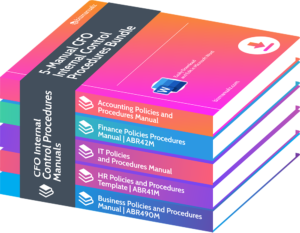What Degree Does a CFO Need?

What degree do you need to be a CFO? Typically, a Bachelor’s in finance, accounting, or a related field is expected. But, many successful CFOs have advanced degrees like and MBA or Master’s in Finance. Having practical experience and continuous learning is also important. Professional development programs, workshops, conferences, and certifications like CPA or CFA can help keep CFOs up-to-date with industry trends and regulations. What degree does a CFO need?
Education Requirements for a CFO
Education requirements for a CFO vary depending on the industry and company size. However, there are some common CFO qualifications that are typically required for this position.
These include:
- A bachelor’s degree in finance, accounting, economics, or a related field is usually the minimum requirement for a CFO role. This provides a strong foundation in financial principles and analysis.
- A master’s degree in business administration (MBA) may be preferred or required by some employers. An MBA can provide a more comprehensive understanding of business management and strategy.
- Professional certifications such as a Certified Public Accountant (CPA) or Chartered Financial Analyst (CFA) are highly valued in the financial industry and can enhance a CFO’s credibility and expertise.
- Experience in finance or accounting is essential for a CFO, with many employers requiring a minimum number of years in a senior financial role.
- Strong analytical and problem-solving skills are necessary for a CFO to effectively analyze financial data and make strategic decisions.
- Excellent communication and leadership abilities are also important as a CFO often interacts with other executives, board members, and stakeholders.
In addition to these education and experience requirements, some companies may also look for specific industry knowledge or experience, such as expertise in healthcare finance or technology finance. Keeping up with industry trends and changes in regulatory compliance is crucial for a CFO’s success.
To enhance their chances of securing a CFO position, aspiring professionals may consider networking, attending industry conferences, and keeping their skills updated through continuing education programs. Developing a strong track record of success in financial management roles and demonstrating innovative thinking can also make candidates stand out.
A CFO needs a bachelor’s degree in finance or accounting, unless they want to play Monopoly with their company’s financials.
Bachelor’s degree in finance or accounting
To be a CFO, you must have a Bachelor’s degree in finance or accounting. It provides the knowledge and skills you need to understand and organization’s finances. Here are six points on why this degree is so important:
- Knowledge: You’ll learn about financial management, planning, investment analysis and accounting principles.
- Analytical skills: You can analyze financial data, identify trends and make informed decisions for the organization’s financial health.
- Compliance: You’ll understand taxation laws and financial reporting standards.
- Strategic decision-making: You can assess risks, evaluate investment opportunities, and optimize capital allocation.
- Communication: You can communicate complex financial info clearly and concisely.
- Ethics: You’ll know ethical values and integrity.
John Smith is and inspiring example of how far a Bachelor’s degree in finance or accounting can take you. He rose from accountant to CFO at a Fortune 500 company. To join him, you need a Master’s degree in business administration. You’ll need those math skills to calculate expenses like ‘number of sleepless nights’!
Master’s degree in business administration (MBA)
A Master’s degree in Business Administration (MBA) is coveted by those who wish to become CFOs. This degree provides in-depth understanding of business elements such as finance, marketing, and management. It focuses on strategic thinking and problem-solving, making it easier to navigate intricate financial landscapes and make wise decisions.
Coursework in MBA programs delve into specific financial topics like corporate finance, investment management, and financial analysis. This gives future CFOs knowledge about financial markets and instruments, enabling them to manage their organizations’ financial health.
MBA programs also offer experiential learning via internships and consulting projects. This allows students to use their knowledge in the real world, and gain valuable insight into financial decision-making.
It needs mentioning that while and MBA is important for CFOs, it is not the only factor for success. Leadership, communication, and industry knowledge also play a part in a CFO’s effectiveness.
Indra Nooyi is and example of the value of and MBA. She was the CFO and later CEO of PepsiCo, and her MBA from Yale University’s School of Management helped her become one of Fortune’s Most Powerful Women in Business.
Professional Certifications for a CFO
Professional certifications for a Chief Financial Officer (CFO) are crucial for their career advancement and expertise in financial management. These certifications indicate a high level of knowledge and proficiency in the field, enhancing their credibility and employability.
- A Certified Public Accountant (CPA) certification is highly valued for CFOs. This certification validates their expertise in accounting principles, financial reporting, and taxation. It demonstrates their ability to analyze financial data and ensure compliance with regulatory requirements.
- Chartered Financial Analyst (CFA) certification is another significant qualification for CFOs. This certification focuses on investment analysis, portfolio management, and ethical standards in the financial industry. CFOs with a CFA designation can excel in financial planning, risk management, and asset allocation.
- The Certified Treasury Professional (CTP) certification is relevant for CFOs involved in treasury management. It showcases their proficiency in cash management, liquidity management, and risk assessment. CFOs with a CTP certification possess the skills to optimize cash flow and make sound financial decisions.
In addition to the above certifications, CFOs can consider advanced degrees such as and MBA or a Master’s in Finance. These degrees provide a comprehensive understanding of financial management principles, strategic decision-making, and leadership skills, complementing the knowledge gained from professional certifications.
A noteworthy incident in the history of CFO certifications is the increasing demand for Certified Management Accountant (CMA) designation. This certification emphasizes management accounting, strategic financial management, and performance analysis. It has gained recognition among CFOs for enhancing their ability to drive organizational profitability and efficiency.
Overall, obtaining professional certifications is essential for CFOs to showcase their expertise, gain a competitive edge, and demonstrate their commitment to professional development in the challenging and dynamic field of financial management.
“Being a CFO is like being a CPA, but with the added stress of having to explain to your boss why the company can’t expense that yacht as a business expense.”
Certified Public Accountant (CPA)
Certified Public Accountant (CPA) is a professional credential that shows expertise in accounting and financial management. CPAs have the skills to tackle difficult financial tasks and provide useful information to businesses and organizations.
To be a CPA, you must meet strict educational criteria and pass and extensive examination that tests your accounting principles and regulations knowledge. You also need to meet certain experience requirements, which depend on the jurisdiction.
Being a CPA has plenty of advantages. It increases career prospects since many employers prefer hiring CPAs for accounting roles due to their broad knowledge and proficiency. CPAs have higher earning potential than non-certified accountants, too.
Furthermore, CPAs need to stick to rigorous codes of conduct, providing clients and employers with faith in their capabilities and guaranteeing transparent financial practices.
Don’t miss out on the rewards of being a Certified Public Accountant. Start your journey towards this respected certification today and open up the doors to a thriving career in finance!
Chartered Financial Analyst (CFA)
The Chartered Financial Analyst (CFA) certification is a prestigious qualification for finance professionals. It requires a rigorous curriculum and a comprehensive examination process. This showcases and individual’s proficiency in financial management, risk analysis, and portfolio management.
Let’s look at the key elements that make it attractive in the finance industry:
| 1. Rigorous Curriculum | The CFA program covers topics such as ethics, quantitative methods, economics, financial statement analysis, corporate finance, investment tools, and portfolio management. |
| 2. Global Recognition | It is a mark of excellence worldwide in the field of investment analysis. It also shows and individual’s commitment to ethical standards and professional competence. |
| 3. Career Advancement | The CFA charter provides doors for career opportunities such as research analyst, portfolio manager, risk manager, financial consultant, or senior executive in financial institutions. |
| 4. Industry Demand | The need for CFAs increases due to the complexity of financial markets and the need for professionals with advanced analytical skills. |
In addition, there are three levels of exams that not only test theoretical knowledge but practical application too. The exam process makes sure that individuals with the CFA designation have acquired a deep understanding of investment principles and can make informed decisions.
CFOs must consider the CFA certification. The role demands expertise in financial analysis, strategic decision-making, and risk management. It also makes candidates stand out from their competitors and enhances their credibility.
Don’t miss out on this opportunity to advance your finance career. Take the challenge of earning the CFA charter and become a successful CFO. Join the elite group of finance professionals and prove you can thrive in today’s dynamic investment landscape.
Skills and competencies needed for a CFO: Forget numbers! The real expertise of a CFO lies in making their non-financial colleagues believe they understand what they’re talking about.
Skills and Competencies Needed for a CFO
Skills and competencies needed for the CFO responsibilities include:
- Financial expertise: A CFO must have in-depth knowledge of financial principles, accounting practices, and financial analysis to make informed decisions.
- Strategic thinking: The ability to develop long-term financial strategies that align with the company’s goals and drive profitability is crucial for a CFO.
- Leadership: As a key member of the executive team, a CFO should possess strong leadership qualities to guide and inspire the finance department and other stakeholders.
- Communication skills: Effective communication, both verbal and written, is essential for a CFO to convey financial information clearly to internal and external parties.
- Risk management: Identifying and mitigating financial risks is a critical skill for a CFO, as they need to ensure the company’s financial stability and compliance.
- Business acumen: A CFO should have a deep understanding of the industry and market trends, enabling them to make informed financial decisions that drive the business forward.
In addition, if you are offering CFO Services, then you should have a strong attention to detail, problem-solving abilities, adaptability to changing market conditions, and the ability to build and maintain strong relationships with key stakeholders.
It is interesting to note that according to a survey conducted by the Financial Executives Research Foundation (FERF), 88% of CFOs believe that possessing strong analytical and financial skills is the most crucial factor for their success in the role.
Financial analysis and forecasting: Where numbers come to life and CFOs play the fortune-telling game, hoping they don’t predict their own bankruptcy.
Financial analysis and forecasting
Financial analysis and forecasting require a strategic mindset and familiarity with financial software tools. It involves analyzing financial statements and assessing risks that could affect the organization’s financial health. Evaluating investment opportunities and developing accurate financial models are key components. As well, monitoring key performance indicators helps track progress.
To be and effective CFO, stay up-to-date with industry trends and regulatory changes that may affect finances. Leverage technology tools to optimize data processing and improve accuracy in forecasts. Also, foster collaboration between finance teams and other departments for more robust analyses. Put your Sherlock Holmes hat on and make decisions that would impress even him!
Strategic planning and decision-making
Strategic planning and decision-making have key aspects. The decision-making process includes:
- Identifying the problem/opportunity
- Gathering relevant info/data
- Evaluating options/alternatives
- Analyzing risks/benefits
- Making and informed decision
Strategic planning steps are:
- Setting objectives
- Environmental analysis
- Strategy formulation
- Resource allocation
- Strategy implementation
CFOs should have strong analytical abilities, financial acumen, and business foresight. They must stay up-to-date with market trends, tech advancements, and industry regulations. Collaborating with cross-functional teams helps mitigate biases and promote innovative thinking. To be successful, CFOs must know how to lead/manage a team.
Leadership and team management
A successful CFO must possess special skills! They should lead by example, demonstrating professionalism, integrity, and a strong work ethic. Communication is key; expectations must be clearly conveyed, feedback given, and listening to concerns is a must. Building strong relationships with team members is essential for collaboration and trust.
Strategic thinking and problem-solving skills are needed to make decisions that meet company goals. Conflict resolution requires identifying and resolving conflicts among team members in a fair manner. and don’t forget mentorship and development for professional growth.
Forget the regular ’10 years of experience’ requirement. The real deal breaker? Surviving board meetings without dozing off or throwing a stapler!
Experience Requirements for a CFO
Experience requirements for a CFO can vary based on industry and company size. However, a solid educational background and years of relevant work experience are generally expected and will arise as CFO interview questions.
Here is a breakdown of the necessary experience for a CFO:
| Educational Qualification | Work Experience | Technical Skills | Soft Skills |
|---|---|---|---|
| Master’s degree in Finance, Accounting, or related field | 10+ years in finance or accounting roles | Advanced knowledge of financial analysis, risk management, and forecasting | Strong leadership, communication, and decision-making abilities |
| Certifications (CPA, CFA, etc.) | Experience in financial planning and strategy | Expertise in financial reporting, budgeting, and cash flow management | Ability to manage and motivate teams, negotiate effectively, and solve complex problems |
In addition to these requirements, it is vital for a CFO to stay updated with industry trends, regulations, and technological advancements. Keeping abreast of changes in the financial landscape helps CFOs make informed decisions and drive the financial success of the organization.
Pro Tip: Networking with other finance professionals and attending industry conferences can provide valuable insights and opportunities for career growth.
Before becoming a CFO, just remember that every finance and accounting role is like a warm-up act for the main event of counting all that cash.
Previous finance and accounting roles
Working in past finance and accounting roles is a must for a CFO. These roles give the skills and knowledge to succeed.
- Financial analysis and reporting is a must. This includes analyzing data, creating reports, and giving insights.
- Budgeting and forecasting knowledge is also needed. CFOs need to know financial planning and build budgets that fit company goals.
- Financial risk management is a must. Identifying risks, putting strategies in place to reduce them, and ensuring compliance is key.
- Managing payroll processes is a must. CFOs must understand payroll systems, tax regulations, and employee benefits.
- International finance is a must. CFOs need to know international markets, foreign exchange rates, and cross-border transactions.
Leadership abilities are also important. CFOs must manage teams, motivate employees, and drive business success. Pro Tip: Showcase your past finance and accounting roles to show you know how to analyze data and make smart recommendations with financial info. Industry-specific know-how is key too; know the secret handshakes and have a few martial arts moves ready for those intense boardroom negotiations.
Industry-specific experience
In the business world, CFOs who have specialized experience in their chosen field stand out from the crowd. Alan is a great example of this. His in-depth knowledge of the tech industry allowed him to successfully implement innovative financial strategies and guide his organization through successful acquisitions.
Whether it be finance, technology, healthcare, manufacturing, or e-commerce, having industry-specific knowledge allows a CFO to make informed decisions, create sustainable growth, and drive success for their organizations while reducing risks.
In conclusion, having specialized experience in the industry you are working in is vital for any CFO – it equips them with the tools to succeed and ensures success for their organizations.
Degree Does a CFO Need
To become a Chief Financial Officer (CFO), one may ask: what degree is needed? A bachelor’s in finance or accounting is common, but advanced qualifications like and MBA or Master’s in Finance can be beneficial. Practical experience is also important. Internships and entry-level positions give hands-on experience to aspiring CFOs.
Networking is key for career advancement. Building connections and finding mentors help. Plus, strong communication and leadership skills are essential for CFOs. Enhancing presentation skills and articulating financial data into insights are also important for success.
Frequently Asked Questions

1. What degree does a CFO need?
A Chief Financial Officer (CFO) typically needs at least a bachelor’s degree in finance, accounting, economics, or a related field. Some companies might require a master’s degree, such as and MBA, for higher-level positions.
2. Are there any specific certifications that would be beneficial for a CFO?
Yes, certifications such as Certified Public Accountant (CPA) or Chartered Financial Analyst (CFA) can be tremendously beneficial for a CFO. These certifications demonstrate expertise and can enhance job prospects.
3. Is and MBA degree necessary to become a CFO?
An MBA degree is not always necessary to become a CFO, but it can be highly advantageous. MBA programs often provide a comprehensive understanding of various business areas, including finance, strategy, and leadership, which can complement the role of a CFO.
4. Can experience substitute for a specific degree?
While relevant experience is certainly valuable, most companies prefer candidates with a degree in finance or a related field. Experience alone may not be sufficient, especially for larger organizations or CFO roles that require a strong educational background.
5. Are there any specialized degrees for CFOs?
While there are no degrees specifically tailored for CFOs, some universities offer executive programs or specialized courses in finance leadership. These programs can provide specific knowledge and skills essential for individuals aspiring to become CFOs.
6. What other skills besides a degree are important for a CFO?
Aside from the necessary degree, CFOs require excellent analytical and problem-solving skills, strong financial acumen, leadership abilities, and effective communication skills. They should also possess strategic thinking capabilities and be adept at managing risk and making sound financial decisions.
















Leave a Reply